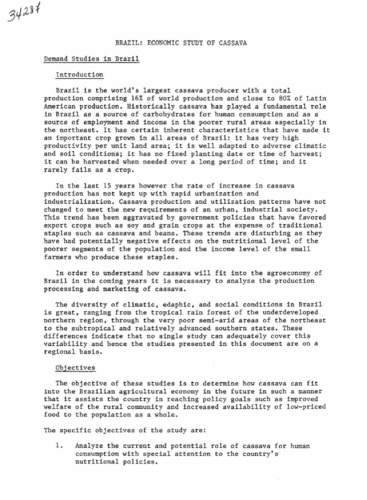Brazil: economic study of cassava
A series of studies were carried out in Brazil, on a regional basis, to determine how cassava can fit into the Brazilian agricultural economy in the future so as to assist the country in reaching policy goals (improved welfare of the rural community and increased availability of low-priced food). The recent developments in the Brazilian agricultural sector are summarized with emphasis on agricultural policies and on the balance between food production and exports. Urbanization as well as wheat subsidies have reduced the importance of cassava. Current policies, however, are found to favor food crops such as cassava that are produced by the small farmers. Trends in cassava for human food and its future potential role are also analyzed. The role of farinha as a staple food should be improved; increased per capita consumption will depend on better availability, better quality, and lower prices. To increase the consumption of fresh cassava, it is necessary to reduce marketing margins. The reduction of production costs of cassava starch is also crucial. The rapidly expanding feed industry is discussed with reference to cassava supply. Improved production technology would mean increased benefits to both producers and consumers. A dried cassava industry would reduce the need to import maize, stabilize on-farm prices of cassava, and extend the market size of the crop, particularly in NE Brazil. The cost structure of cassava production and processing is analyzed from the viewpoint of the cassava's future role as a source of rural income and its contribution to the food and feed supply. (CIAT)

